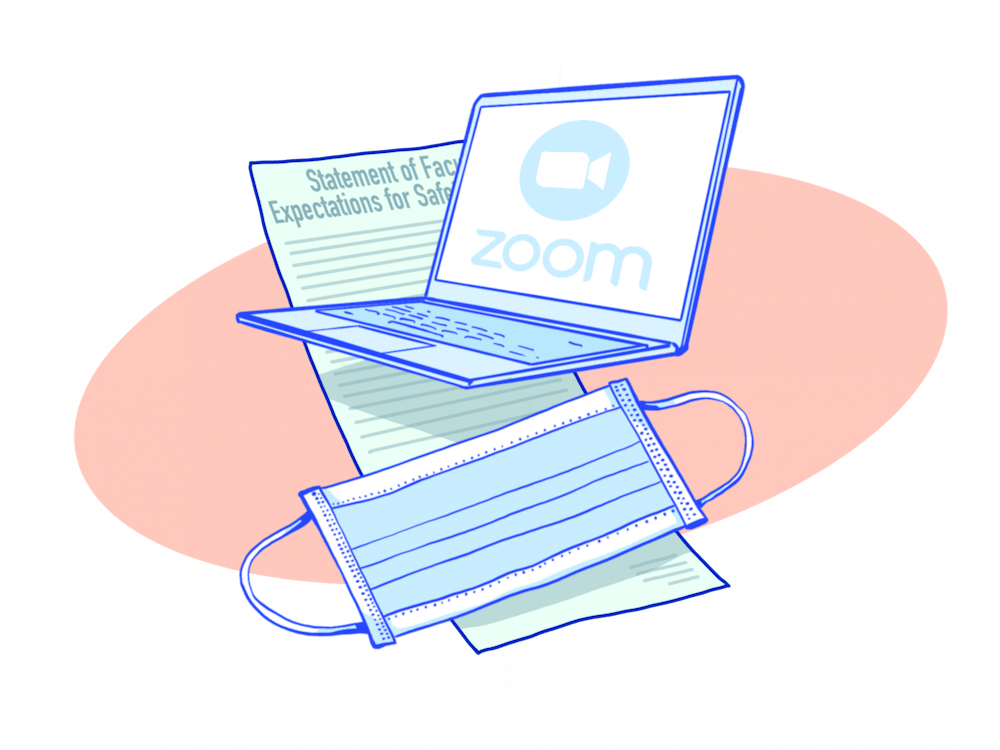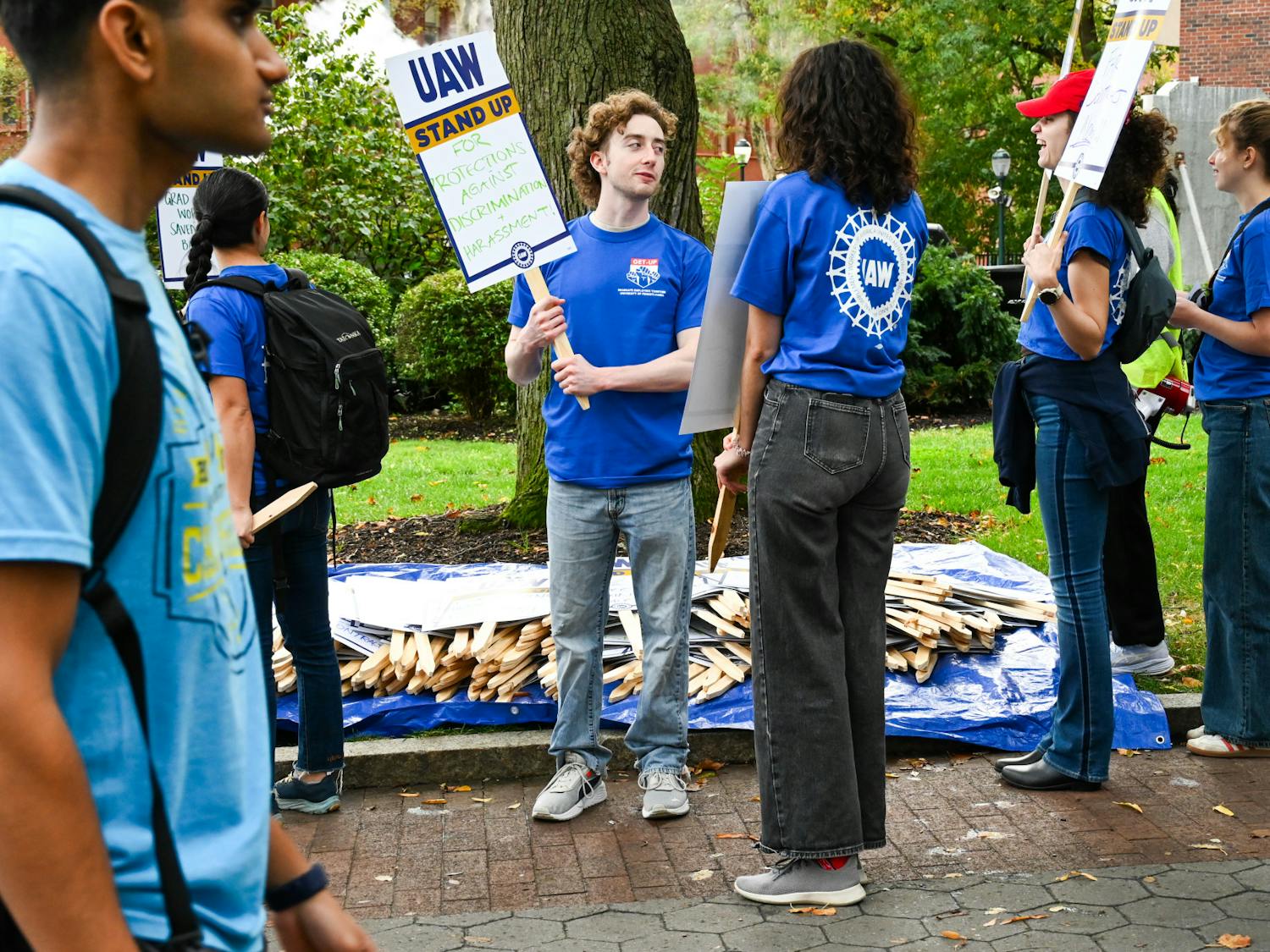Penn's chapter of the American Association of University Professors sent a list of faculty expectations for COVID-19 work safety guidelines to the University — the latest installment in a series of tense exchanges between faculty members and administrators regarding virus safety in the classroom.
The statement, sent to administrators on Sept. 11, outlines three main recommendations for Penn: to include classrooms in contact tracing procedures and notify instructors, staff, and students of a positive case in the classroom; to announce clear masking guidelines and provide free, high-quality masks to everyone required to work and study on campus; and to allow instructors to choose whether to teach in person or virtually.
AAUP-Penn is a membership-based national professional organization created by Penn faculty members earlier this spring that seeks to advance shared university governance and academic freedom, define professional values and standards, and promote economic security for university faculty members.
"There is broad consensus that Penn must institute the following measures if the University expects faculty and staff to work productively and well this semester under potentially life-threatening conditions," the AAUP-Penn statement reads.
In an emailed response to AAUP-Penn leaders on Sept. 13, Vice Provost for Faculty Laura Perna maintained that "Penn operates with the expectation that our students receive – and reap the benefits of – an in-person pedagogical experience," adding that the University is working closely with the Faculty Senate, the body that serves as the representative voice for full-time teaching faculty, to address issues of faculty safety.
Perna wrote that instructors may consult with their schools to temporarily switch to remote instruction if many students are absent from class. To date, Perna wrote that school deans have received "an extremely small number of requests for exemption from in-person teaching, with no requests in several schools," and that these requests have received guidance from the Provost's Office.
AAUP-Penn President and English professor Suvir Kaul said that the faculty organization's goal is to ensure that each faculty member is able to choose the instruction delivery method that best suits them and their personal circumstances without having to proceed through a complicated process with the University. AAUP-Penn is not advocating for a full return to virtual instruction, Kaul said, adding that he himself is eager to be back in the classroom.
Penn undergraduate professors are currently required to teach in person, though medical exemptions can be granted through receipt of a medical accommodation from the Office of Affirmative Action and Equal Opportunity Programs. Kaul said he worries about the potential complications this process may pose for faculty.
RELATED:
Some professors remain on Zoom despite resumption of in-person learning this semester
La Salle resumes in-person classes after moving online due to COVID-19
Penn hopeful entire semester will be in person after finding no COVID-19 classroom transmission
The AAUP-Penn recommendations come just weeks after more than 225 faculty members signed a petition, sent to administrators on Aug. 22, urging Penn to allow instructors to choose whether they want to deliver course instruction virtually or in person.
AAUP-Penn met with University administrators on Aug. 27 “to relay still unaddressed safety concerns" and to reiterate calls for faculty to be able to determine the instruction format of their classes.
Kaul said although attending administrators were respectful and attentive, the meeting failed to yield any concrete steps toward AAUP-Penn's goals.
Shortly afterward, the Faculty Senate held a virtual seminar on Sept. 1 to address faculty attendees' pre-written questions they posed about in-person learning. Panelists at the seminar included Perna, Chief Wellness Officer Benoit Dubé, Vice President for Human Resources Jack Heuer, and Vice President for Facilities and Real Estate Services Anne Papageorge.
As stated in her recent email to AAUP-Penn, Perna told attendees at the meeting that Penn is committed to in-person learning and that online instruction cannot replace an experience in the classroom.
The virtual seminar prompted discontent among faculty, some of whom anonymously left critical messages in the chat box. Many messages criticized the University's lack of clear communication and highlighted the personal stress faculty members have felt throughout the pandemic.
“I have not received a single university communication that has even acknowledged how stressful this situation is for caregivers of vulnerable populations, including children who cannot be vaccinated. What is the University doing to support these families?” one attendee wrote.
“I don't understand why the classroom is considered low-risk exposure. We spend 180 minutes per week per class with these students in packed conditions, sometimes in very small rooms, with many people speaking, some in inadequate or improperly worn masks,” another attendee wrote.
Other messages questioned the expertise of the speakers, with one commenter asking whether there was a public health expert on the panel. AAUP-Penn leaders later accused administrators of evading questions in a statement released on Sept. 3, the day after the faculty seminar.
AAUP-Penn asserted in its Sept. 11 statement that the University is downplaying the risks of COVID-19 by forcing professors to teach in person.
"The key principle at issue here bears stating directly: while our levels of comfort with the risks may vary, it should not be assumed that anyone — not faculty, building maintenance staff, graduate student instructors, office staff, cafeteria workers, librarians, RAs, etc.— has agreed to risk their lives and the lives of loved ones in order to do their jobs," the statement reads.









